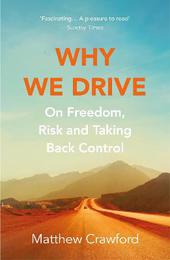
|
Why We Drive: On Freedom, Risk and Taking Back Control
Paperback / softback
Main Details
| Title |
Why We Drive: On Freedom, Risk and Taking Back Control
|
| Authors and Contributors |
By (author) Matthew Crawford
|
| Physical Properties |
| Format:Paperback / softback | | Pages:368 | | Dimensions(mm): Height 200,Width 130 |
|
| Category/Genre | Popular philosophy
Impact of science and technology on society
Cars |
|---|
| ISBN/Barcode |
9781784707958
|
| Classifications | Dewey:303.483 |
|---|
| Audience | | General | | Tertiary Education (US: College) | | Professional & Vocational | |
|---|
|
Publishing Details |
| Publisher |
Vintage Publishing
|
| Imprint |
Vintage
|
| Publication Date |
27 May 2021 |
| Publication Country |
United Kingdom
|
Description
An irreverent and ingenious celebration of the rebellious human spirit vs corporate technocracy Why We Drive is a rebellious and daring celebration of the human spirit and the competence of ordinary people by the bestselling author of The Case for Working with Your Hands. Once we were drivers on the open road. Today we are more often in the back seat of an Uber. As we hurtle toward a 'self-driving' future, are we destined to become passengers in our own lives too? In Why We Drive, the philosopher and mechanic Matthew Crawford celebrates the risk, skill and freedom of driving. He reveals what we are losing to technology and government control in the modern world, and speaks up for play, dissent and occasionally being scared witless. 'Fascinating... A pleasure to read' Sunday Times 'Persuasive and thought-provoking... A vivid and heartfelt manifesto' Observer
Author Biography
Matthew Crawford is the author of The Case for Working with Your Hands- Or Why Office Work Is Bad For Us and Fixing Things Feels Good and The World Beyond Your Head- How to Flourish in an Age of Distraction, which have been translated around the world. His writing has also appeared in the New York Times, Sunday Times, Guardian, Independent, Wall Street Journal as well as numerous magazines and journals. Matthew is a senior fellow at the University of Virginia's Institute for Advanced Studies in Culture, lectures internationally and runs a motorcyle repair shop.
ReviewsOne of the most original and mind-opening studies of practical philosophy to have appeared for many years -- John Gray * Unherd * Persuasive and thought-provoking ... a vivid and heartfelt manifesto against ...the loss of individual agency and the human pleasure of acquired skill and calculated risk ... Not since Zen and the Art of Motorcycle Maintenance has someone better articulated the soul-enhancing possibilities of tinkering with tools, making useful stuff work well ... a powerful (and enjoyable) corrective against that wisdom that suggests the unchecked march of all-seeing tech monopolies ... is essential to human progress -- TIM ADAMS * Observer * Matthew Crawford is the grand master of the everyday. He alerts us to the deeper meaning in ordinary activities, such as driving a car, and how they connect to concerns about freedom, responsibility and moral choice. Even if you have no interest in driving you will find yourself swept up by his elegant prose and glad to find his humane intelligence doing battle with some of the most troubling trends in modern life -- DAVID GOODHART, author of The Road to Somewhere Matthew Crawford is one of those who believes that western societies are being blighted by what he terms safetyism, the elevation of safety above all else. He argues that when the state cocoons its citizens from dangers, people lose the elemental pleasure, autonomy, mastery and sense of discovery that comes from taking their own decisions and risks ... He makes the case for a broader view of the purpose of life than simply the defence of it ... I am with Crawford -- JENNI RUSSELL * The Times * A pleasure to read ... His thesis demands that he convey the pleasure of driving, and he's up to the task ... And he addresses some huge, fascinating issues: how people retain self-respect when computers are deskilling them, and sovereignty over their lives when computers are spying on them. Much of modern life raises these questions, but people's relationship with their cars perhaps best exemplifies them ... an enjoyable, scenic cruise round a fascinating landscape -- EMMA DUNCAN * Sunday Times *
|